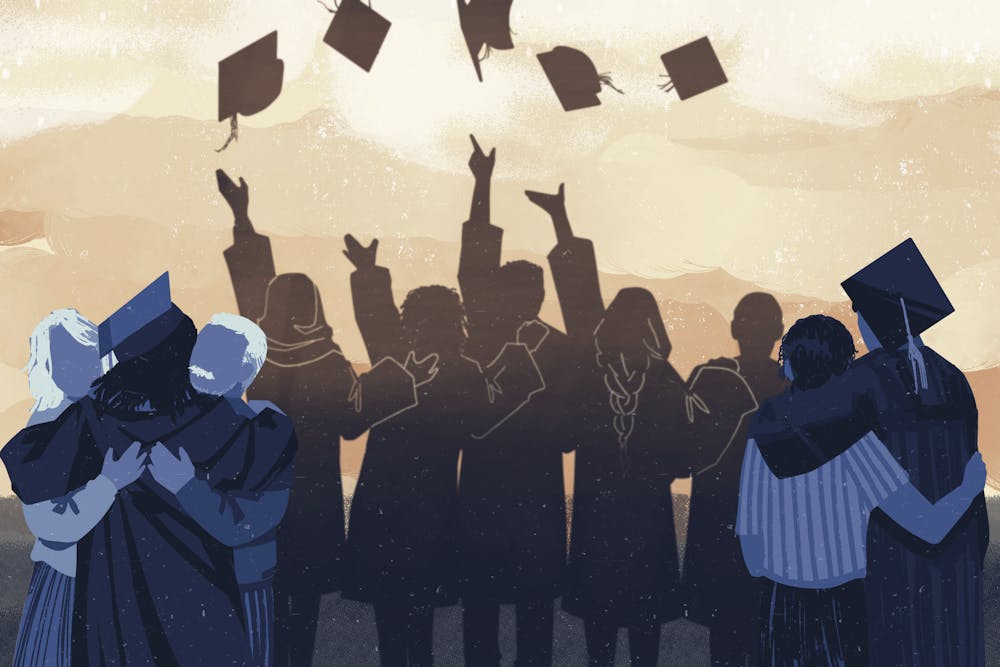Going to college as a first-generation student is a major accomplishment that only a minority of students can claim. This feat comes with many struggles once they make it to college, however, such as being unaware of certain resources and receiving a lack of direction from parents.
According to a 2018 study from Sage Journals, parents who went to college are more likely to encourage their children to take advantage of the resources available to help them succeed. But students whose parents did not attend college may not even know what resources are available or how to utilize them.
“Before I got to college, I was really, I want to say intimidated just because, (as a) first-gen, I don't really have a lot of guidance as to how college is going to be, like how I should navigate certain situations,” fourth-year political science student Brooklyn Nevarez said.

Fewer first-generation college graduates use career-planning services, such as career fairs and resume assistance, than continuing-generation college graduates. According to a 2023 Forbes article, only about 46% of first-generation students participate in clubs on campus, compared to 65% of non first-generation students that participate.
Students whose parents attended college have an automatic advantage. According to the study from Sage Journals, this is mainly due to the parents' ability to guide their child, having gone through the collegiate experience themselves. They are also more likely to push their child to succeed in college.
Personal finances could also play a role in how students utilize the school's resources. The majority of first-generation students come from low income backgrounds. This is because the salary of those without a college degree is typically lower than those who do have one, according to a 2018 study done by the U.S. Bureau of Labor Statistics. For this reason, not all students can afford to use programs meant to assist them in their academic and professional journeys.
Internships and study abroad programs can boost students' careers tremendously. Both give students hands-on learning experience and networking opportunities that could lead them to a future career. However, many students don't have the financial means to do these things, therefore putting them at a disadvantage.
“When I hear other people who have family that went to college, they talk a lot more about affording different things or affording different experiences, especially unpaid internships or going abroad,” Nevarez said.
More financial aid and scholarship opportunities that are specifically tailored to the needs of first-generation students should be provided. These could include grants, tuition waivers and work-study opportunities, which would alleviate the cost barrier that many first-generation students face.
First-generation college students universally face struggles, such as a lack of funds and fear of seeking help. However, USC has taken a step in the right direction in its push to eliminate these issues. In the fall of 2024, the university is set to turn Maxcy College into a Living & Learning Community (LLC) and resource center for first-generation college students.
A few programs have also been made by students at the university to provide community and solidarity amongst first-generation students. Some of them include Tri-Alpha, First Generation Students and First Generation Students in the Engineering and Computing College.
“I feel like, since I've been here, there's been a lot of initiatives to include first-generation students,” said Sarah Tra, a third-year biology student and member of Tri-Alpha.
Getting involved in campus programs is a great way for students to stay involved, and building communities within the school makes such a large group of people, such as first-generation students, feel at home.
First-generation students should feel proud of themselves. Taking the initiative and becoming the first in the family to go to college is something that not many people have the courage or determination to do.
“There are a few students who come into college thinking that being first-generation might be that not-so-great part of their student identity, Tra said. “But, I mean, ever since coming here to South Carolina, I've really learned to embrace it, and it’s not anything to be ashamed of. I think it's something to be proud of.”
First-generation students are role models for all college students. They represent the value of determination and inspire others to reach for their dreams, no matter their circumstances. It is important that these students continue to receive the resources that help them to succeed.
It is the university's job to provide a safe space for these students to do so. This means that the university needs to create more programs to aid these students.
The university should conduct more outreach to help first-generation students realize what resources are available to them. As in, the university should be making an effort to provide these students with information about financial aid and campus resources. It can achieve this by reaching out to students through email or with one-on-one advisement meetings.
Also, career development services on campus, such as internships, job placement assistance and professional development workshops, should be enhanced and tailored to better assist these students. These programs can include assistance with resume writing, interview preparation, job search strategies and career goal setting. This will help to properly prepare them within the professional field.
Because of the struggles they face, first-generation college students need additional resources to help them succeed. So it is important that the university continues to aid them in any way it can.

